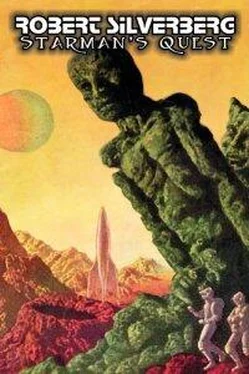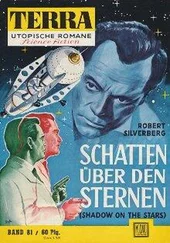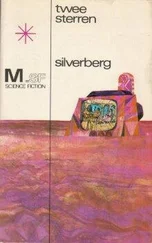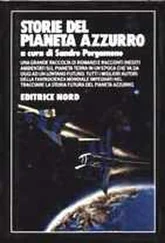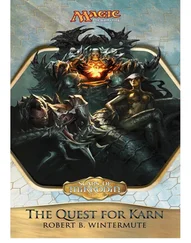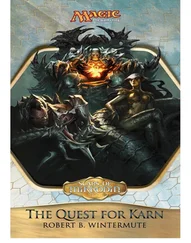Robert Silverberg - Starman's Quest
Здесь есть возможность читать онлайн «Robert Silverberg - Starman's Quest» весь текст электронной книги совершенно бесплатно (целиком полную версию без сокращений). В некоторых случаях можно слушать аудио, скачать через торрент в формате fb2 и присутствует краткое содержание. Год выпуска: 1958, Издательство: Gnome Press, Жанр: Фантастика и фэнтези, на английском языке. Описание произведения, (предисловие) а так же отзывы посетителей доступны на портале библиотеки ЛибКат.
- Название:Starman's Quest
- Автор:
- Издательство:Gnome Press
- Жанр:
- Год:1958
- ISBN:нет данных
- Рейтинг книги:3 / 5. Голосов: 1
-
Избранное:Добавить в избранное
- Отзывы:
-
Ваша оценка:
- 60
- 1
- 2
- 3
- 4
- 5
Starman's Quest: краткое содержание, описание и аннотация
Предлагаем к чтению аннотацию, описание, краткое содержание или предисловие (зависит от того, что написал сам автор книги «Starman's Quest»). Если вы не нашли необходимую информацию о книге — напишите в комментариях, мы постараемся отыскать её.
Starman's Quest — читать онлайн бесплатно полную книгу (весь текст) целиком
Ниже представлен текст книги, разбитый по страницам. Система сохранения места последней прочитанной страницы, позволяет с удобством читать онлайн бесплатно книгу «Starman's Quest», без необходимости каждый раз заново искать на чём Вы остановились. Поставьте закладку, и сможете в любой момент перейти на страницу, на которой закончили чтение.
Интервал:
Закладка:
But Hawkes was not worried. “You’ll make the grade, Alan. A few more weeks, days maybe, while you learn the combinations, limber up your fingers, pick up the knack of thinking fast—you’ll get there.”
“I’m glad you’re so optimistic.” Alan felt downcast. He had dropped three hundred credits that evening, and it seemed to him that his fumbling fingers would never learn to set up the combinations fast enough. He was just like Steve, a born loser, without the knack the game required. “Oh, well, it’s your money.”
“And I expect you to double it for me some day. I’ve got a five-to-one bet out now that you’ll make Class B before fall.”
Alan snorted doubtfully. In order to make Class B, he would have to make average winnings of two hundred credits a night for ten days running, or else win three thousand credits within a month. It seemed a hopeless task.
But, as usual, Hawkes won the bet. Alan’s luck improved as May passed and June dwindled; at the beginning of July he hit a hot streak when he seemed to be marching up to the winner’s rostrum every other round, and the other Class C patrons began to grumble. The night he came home with six hundred newly-won credits, Hawkes opened a drawer and took out a slim, sleek neutrino gun.
“You’d better carry this with you from now on,” the gambler said.
“What for?”
“They’re starting to notice you now. I hear people talking. They know you’re carrying cash out of the game parlors every night.”
Alan held the cool gray weapon, whose muzzle could spit a deadly stream of energized neutrinos, undetectable, massless, and fatal. “If I’m held up I’m supposed to use this?”
“Just the first time,” Hawkes said. “If you do the job right, you won’t need to use it any more. There won’t be any second time.”
As it turned out, Alan had no need for the gun, but he carried it within easy reach whenever he left the apartment. His skill at the game continued to increase; it was, he saw, just like astrogation, and with growing confidence he learned to project his moves three and sometimes four numbers ahead.
On a warm night in mid-July the proprietor of the games hall Alan frequented most regularly stopped him as he entered.
“You’re Donnell, aren’t you?”
“That’s right. Anything wrong?”
“Nothing much, except that I’ve been tallying up your take the past two weeks. Comes to close to three thousand credits, altogether. Which means you’re not welcome around this parlor any more. Nothing personal, son. You’d better carry this with you next time out.”
Alan took the little card the proprietor offered him. It was made of gray plastic, and imprinted on it in yellow were the letters, CLASS B. He had been promoted.
Chapter Thirteen
Things were not quite so easy in the Class B games parlors. Competition was rough. Some of the players were, like Alan, sharp newcomers just up from the bottom of the heap; others were former Class A men who were sliding down again, but still did well enough to hang on in Class B. Every day, some of the familiar faces were gone, as one man after another failed to meet the continuing qualifications for the intermediary class.
Alan won fairly steadily—and Hawkes, of course, was a consistent winner on the Class A level. Alan turned his winnings over to the older man, who then allowed him to draw any cash he might need without question.
The summer rolled on through August—hot and sticky, despite the best efforts of the local weather-adjustment bureau. The cloud-seeders provided a cooling rain-shower at about 0100 every night to wash away the day’s grime. Alan was usually coming home at that time, and he would stand in the empty streets letting the rain pelt down on him, and enjoying it. Rain was a novelty for him; he had spent so much of his life aboard the starship that he had had little experience with it. He was looking forward to the coming of winter, and with it snow.
He hardly ever thought of the Valhalla . He disciplined himself to keep thoughts of the starship out of his mind, for he knew that once he began regretting his decision there would be no stopping. Life on Earth was endlessly fascinating; and he was confident that someday soon he would get a chance to begin tracking down the Cavour hyperdrive.
Hawkes taught him many things—how to wrestle, how to cheat at cards, how to throw knives. None of the things Alan learned from Hawkes were proper parts of the education of a virtuous young man—but on Earth, virtue was a negative accomplishment. You were either quick or dead. And until he had an opportunity to start work on the hyperdrive, Alan knew he had better learn how to survive on Earth. Hawkes was a master of survival techniques; Alan was a good student.
He had his first test on a muggy night early in September. He had spent his evening at the Lido, a flossy games parlor in the suburb of Ridgewood, and had come away with better than seven hundred credits—the second best single night he had ever had. He felt good about things. Hawkes was working at a parlor far across the city, and so they did not arrange to meet when the evening was over; instead, they planned to come home separately. Usually they talked for an hour or two each night before turning in, Alan reviewing his evening’s work and having Hawkes pick out the weak points in his technique and show him the mistakes he had made.
Alan reached Hasbrouck about 0030 that evening. There was no moon; and in Hasbrouck the street-lighting was not as efficient as it was in more respectable areas of York City. The streets were dark. Alan was perspiring heavily from the humidity. But the faint hum of the cloud-seeders’ helicopters could be heard; the evening rain was on the way. He decided to wait outside a while.
The first drops splashed down at 0045. Alan grinned gleefully as the cool rain washed away the sweat that clung to him; while pedestrians scurried for cover, he gloried in the downpour.
Darkness lay all around. Alan heard sudden footsteps; a moment later he felt sharp pressure in the small of his back and a hand gripping his shoulder.
A quiet voice said, “Hand over your cash and you won’t get hurt.”
Alan froze just an instant. Then the months of Hawkes’ training came into play. He wiggled his back tentatively to see whether the knife was penetrating his clothing. Good; it wasn’t.
In one quick motion he whirled and spun away, dancing off to the left and clubbing down sharply on his opponent’s knife-hand. A grunted exclamation of pain rewarded him. He stepped back two steps; as his attacker advanced, Alan drove a fist into his stomach and leaped lithely away again. This time his hand emerged holding the neutrino gun.
“Stand where you are or I’ll burn you,” he said quietly. The shadow-shrouded attacker made no move. Cautiously Alan kicked the fallen knife out of his reach without lowering his gun.
“Okay,” Alan said. “Come on over here in the light where I can see who you are. I want to remember you.”
But to his astonishment he felt strong arms slipping around his and pinioning him; a quick twist and his neutrino gun dropped from his numbed hands. The arms locked behind his back in an unbreakable full nelson.
Alan writhed, but it was no use. The hidden accomplice held him tightly. And now the other man came forward and efficiently went through his pockets. Alan felt more angry than afraid, but he wished Hawkes or someone else would come along before this thing went too far.
Suddenly Alan felt the pressure behind his neck easing up. His captor was releasing him. He poised, debating whether or not to whirl and attack, when a familiar voice said, “Rule Number One: never leave your back unguarded for more than half a second when you’re being held up. You see what happens.”
Читать дальшеИнтервал:
Закладка:
Похожие книги на «Starman's Quest»
Представляем Вашему вниманию похожие книги на «Starman's Quest» списком для выбора. Мы отобрали схожую по названию и смыслу литературу в надежде предоставить читателям больше вариантов отыскать новые, интересные, ещё непрочитанные произведения.
Обсуждение, отзывы о книге «Starman's Quest» и просто собственные мнения читателей. Оставьте ваши комментарии, напишите, что Вы думаете о произведении, его смысле или главных героях. Укажите что конкретно понравилось, а что нет, и почему Вы так считаете.
